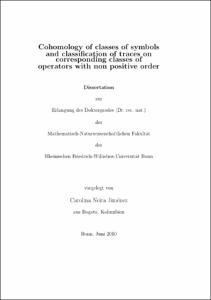Neira Jiménez, Carolina: Cohomology of classes of symbols and classification of traces on corresponding classes of operators with non positive order. - Bonn, 2010. - Dissertation, Rheinische Friedrich-Wilhelms-Universität Bonn.
Online-Ausgabe in bonndoc: https://nbn-resolving.org/urn:nbn:de:hbz:5N-22143
Online-Ausgabe in bonndoc: https://nbn-resolving.org/urn:nbn:de:hbz:5N-22143
@phdthesis{handle:20.500.11811/4617,
urn: https://nbn-resolving.org/urn:nbn:de:hbz:5N-22143,
author = {{Carolina Neira Jiménez}},
title = {Cohomology of classes of symbols and classification of traces on corresponding classes of operators with non positive order},
school = {Rheinische Friedrich-Wilhelms-Universität Bonn},
year = 2010,
month = jul,
note = {This thesis is devoted to the classification issue of traces on classical pseudo-differential operators with fixed non positive order on closed manifolds of dimension $n>1$. We describe the space of homogeneous functions on a symplectic cone in terms of Poisson brackets of appropriate homogeneous functions, and we use it to find a representation of a pseudo-differential operator as a sum of commutators. We compute the cohomology groups of certain spaces of classical symbols on the $n$--dimensional Euclidean space with constant coefficients, and we show that any closed linear form on the space of symbols of fixed order can be written either in terms of a leading symbol linear form and the noncommutative residue, or in terms of a leading symbol linear form and the cut-off regularized integral. On the operator level, we infer that any trace on the algebra of classical pseudo-differential operators of order $a\in\Z$ can be written either as a linear combination of a generalized leading symbol trace and the residual trace when $-n+1\leq2a\leq0$, or as a linear combination of a generalized leading symbol trace and any linear map that extends the $L^2$--trace when $2a\leq-n\leq a$. In contrast, for odd class pseudo-differential operators in odd dimensions, any trace can be written as a linear combination of a generalized leading symbol trace and the canonical trace. We derive from these results the classification of determinants on the Fr\'echet Lie group associated to the algebras of classical pseudo-differential operators with non positive integer order.},
url = {https://hdl.handle.net/20.500.11811/4617}
}
urn: https://nbn-resolving.org/urn:nbn:de:hbz:5N-22143,
author = {{Carolina Neira Jiménez}},
title = {Cohomology of classes of symbols and classification of traces on corresponding classes of operators with non positive order},
school = {Rheinische Friedrich-Wilhelms-Universität Bonn},
year = 2010,
month = jul,
note = {This thesis is devoted to the classification issue of traces on classical pseudo-differential operators with fixed non positive order on closed manifolds of dimension $n>1$. We describe the space of homogeneous functions on a symplectic cone in terms of Poisson brackets of appropriate homogeneous functions, and we use it to find a representation of a pseudo-differential operator as a sum of commutators. We compute the cohomology groups of certain spaces of classical symbols on the $n$--dimensional Euclidean space with constant coefficients, and we show that any closed linear form on the space of symbols of fixed order can be written either in terms of a leading symbol linear form and the noncommutative residue, or in terms of a leading symbol linear form and the cut-off regularized integral. On the operator level, we infer that any trace on the algebra of classical pseudo-differential operators of order $a\in\Z$ can be written either as a linear combination of a generalized leading symbol trace and the residual trace when $-n+1\leq2a\leq0$, or as a linear combination of a generalized leading symbol trace and any linear map that extends the $L^2$--trace when $2a\leq-n\leq a$. In contrast, for odd class pseudo-differential operators in odd dimensions, any trace can be written as a linear combination of a generalized leading symbol trace and the canonical trace. We derive from these results the classification of determinants on the Fr\'echet Lie group associated to the algebras of classical pseudo-differential operators with non positive integer order.},
url = {https://hdl.handle.net/20.500.11811/4617}
}






